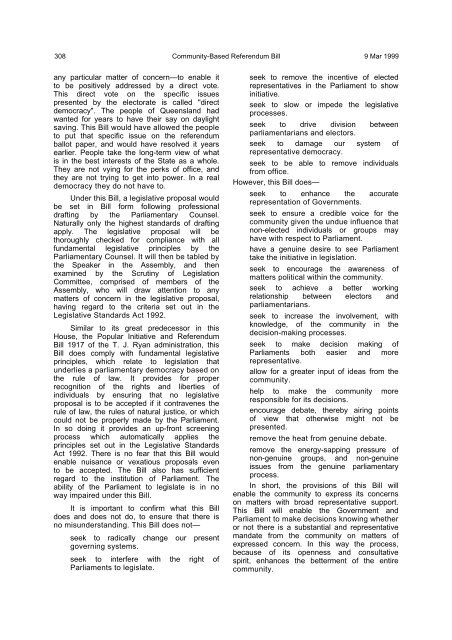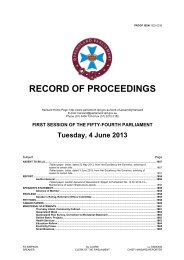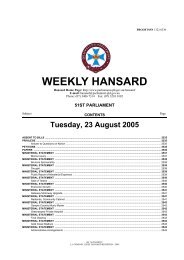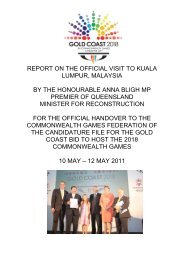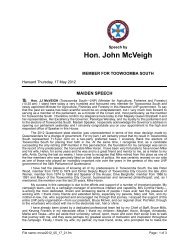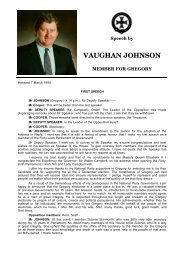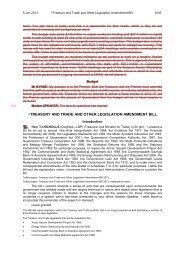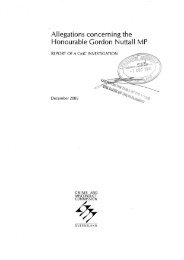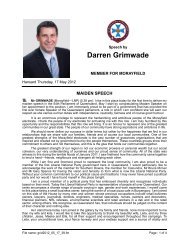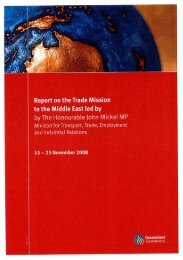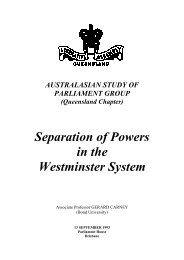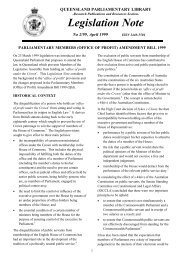Full transcript - Final - Queensland Parliament - Queensland ...
Full transcript - Final - Queensland Parliament - Queensland ...
Full transcript - Final - Queensland Parliament - Queensland ...
You also want an ePaper? Increase the reach of your titles
YUMPU automatically turns print PDFs into web optimized ePapers that Google loves.
308 Community-Based Referendum Bill 9 Mar 1999<br />
any particular matter of concern—to enable it<br />
to be positively addressed by a direct vote.<br />
This direct vote on the specific issues<br />
presented by the electorate is called "direct<br />
democracy". The people of <strong>Queensland</strong> had<br />
wanted for years to have their say on daylight<br />
saving. This Bill would have allowed the people<br />
to put that specific issue on the referendum<br />
ballot paper, and would have resolved it years<br />
earlier. People take the long-term view of what<br />
is in the best interests of the State as a whole.<br />
They are not vying for the perks of office, and<br />
they are not trying to get into power. In a real<br />
democracy they do not have to.<br />
Under this Bill, a legislative proposal would<br />
be set in Bill form following professional<br />
drafting by the <strong>Parliament</strong>ary Counsel.<br />
Naturally only the highest standards of drafting<br />
apply. The legislative proposal will be<br />
thoroughly checked for compliance with all<br />
fundamental legislative principles by the<br />
<strong>Parliament</strong>ary Counsel. It will then be tabled by<br />
the Speaker in the Assembly, and then<br />
examined by the Scrutiny of Legislation<br />
Committee, comprised of members of the<br />
Assembly, who will draw attention to any<br />
matters of concern in the legislative proposal,<br />
having regard to the criteria set out in the<br />
Legislative Standards Act 1992.<br />
Similar to its great predecessor in this<br />
House, the Popular Initiative and Referendum<br />
Bill 1917 of the T. J. Ryan administration, this<br />
Bill does comply with fundamental legislative<br />
principles, which relate to legislation that<br />
underlies a parliamentary democracy based on<br />
the rule of law. It provides for proper<br />
recognition of the rights and liberties of<br />
individuals by ensuring that no legislative<br />
proposal is to be accepted if it contravenes the<br />
rule of law, the rules of natural justice, or which<br />
could not be properly made by the <strong>Parliament</strong>.<br />
In so doing it provides an up-front screening<br />
process which automatically applies the<br />
principles set out in the Legislative Standards<br />
Act 1992. There is no fear that this Bill would<br />
enable nuisance or vexatious proposals even<br />
to be accepted. The Bill also has sufficient<br />
regard to the institution of <strong>Parliament</strong>. The<br />
ability of the <strong>Parliament</strong> to legislate is in no<br />
way impaired under this Bill.<br />
It is important to confirm what this Bill<br />
does and does not do, to ensure that there is<br />
no misunderstanding. This Bill does not—<br />
seek to radically change our present<br />
governing systems.<br />
seek to interfere with the right of<br />
<strong>Parliament</strong>s to legislate.<br />
seek to remove the incentive of elected<br />
representatives in the <strong>Parliament</strong> to show<br />
initiative.<br />
seek to slow or impede the legislative<br />
processes.<br />
seek to drive division between<br />
parliamentarians and electors.<br />
seek to damage our system of<br />
representative democracy.<br />
seek to be able to remove individuals<br />
from office.<br />
However, this Bill does—<br />
seek to enhance the accurate<br />
representation of Governments.<br />
seek to ensure a credible voice for the<br />
community given the undue influence that<br />
non-elected individuals or groups may<br />
have with respect to <strong>Parliament</strong>.<br />
have a genuine desire to see <strong>Parliament</strong><br />
take the initiative in legislation.<br />
seek to encourage the awareness of<br />
matters political within the community.<br />
seek to achieve a better working<br />
relationship between electors and<br />
parliamentarians.<br />
seek to increase the involvement, with<br />
knowledge, of the community in the<br />
decision-making processes.<br />
seek to make decision making of<br />
<strong>Parliament</strong>s both easier and more<br />
representative.<br />
allow for a greater input of ideas from the<br />
community.<br />
help to make the community more<br />
responsible for its decisions.<br />
encourage debate, thereby airing points<br />
of view that otherwise might not be<br />
presented.<br />
remove the heat from genuine debate.<br />
remove the energy-sapping pressure of<br />
non-genuine groups, and non-genuine<br />
issues from the genuine parliamentary<br />
process.<br />
In short, the provisions of this Bill will<br />
enable the community to express its concerns<br />
on matters with broad representative support.<br />
This Bill will enable the Government and<br />
<strong>Parliament</strong> to make decisions knowing whether<br />
or not there is a substantial and representative<br />
mandate from the community on matters of<br />
expressed concern. In this way the process,<br />
because of its openness and consultative<br />
spirit, enhances the betterment of the entire<br />
community.


